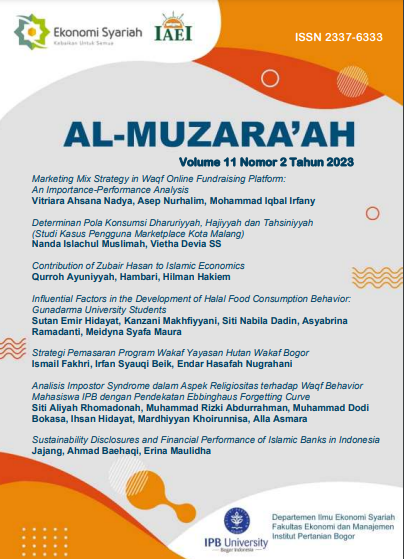Contribution of Zubair Hasan to Islamic Economics
Main Article Content
Abstract
Islamic economics has been growing immensely for almost four decades since the First International Conference on Islamic economics held in Makkah in February 1976. Many improvements on developing Islamic economics as an independent discipline have been done by many scholars. One of the most prominent contemporary scholars who have made some significant work in building Islamic economics by combining the existing modern economics with Islamic teaching is Zubair Hasan. Therefore, the main objective of the study is to provide a summary and analysis of Hasan’s economic thought on Islamic economics. The study is based on secondary data, taken from some books, articles, and journal that Hasan has produced. This study uses a descriptive analysis and employs an inductive approach in tracking and collecting materials and references written by Zubair Hasan from 1975 to 2014. The analytical approach was used to identify Hasan’s thought on several topics in the area of Islamic economics. The study suggests Hasan views on Islamic economics are comprehensive and cover almost all aspects that Islamic economics needs to explain. This includes underlying assumptions, scope of objectives, the role of state and individual, institutional frameworks, distribution, and profit in Islam. His analysis is basically a critical integration between modern economics with Islamic heritage.
Article Details
Section
Author(s) who published in this journal agree to following terms:
- Authors understand and agree that copyright of manuscripts published are held by Al-Muzara'ah. The statement to release the copyright to Al-Muzara'ah is stated in Copyright Transfer Agreement (CTA) form.
- Copyright encompass exclusive rights to reproduce, to distribute, and to sell any part of the journal articles in all form and media.
This work is licensed under a Creative Commons Attribution-ShareAlike 4.0 International License (CC BY-SA) where Authors and Readers can copy and redistribute the material in any medium or format, as well as remix, transform, and build upon the material for any purpose, but they must give appropriate credit (cite to the article or content), provide a link to the license, and indicate if changes were made. If you remix, transform, or build upon the material, you must distribute your contributions under the same license as the original.
References
Furqani, H. (2018). Defining Islamic economics: Scholars’ approach, clarifying the nature, scope and subject-matter of the discipline. Turkish Journal of Islamic Economics, 5(2), 69–93. https://doi.org/10.26414/m025.
Haneef, M. A. (1995). Contemporary Islamic Economic Thought (A Selected Comparative Analysis). Petaling Jaya (MY), Ikraq.
Hasan, Z. (1975). Theory of Profit. New Delhi (IN), Vikas Publishing House.
Hasan, Z. (1983). Profit theory: The Islamic viewpoint. Journal of Islamic Economics, 1(1), 3-14.
Hasan, Z. (2002). Maximisation postulates and their efficacy for Islamic economics. American Journal of Islamic Social Sciences, 19(1), 95-118.
Hasan, Z. (2005). Treatment of consumption in Islamic economics: An appraisal. Journal of King Abdulaziz University: Islamic Economics, 18(2), 29-46.
Hasan, Z. (2006). Introduction to Microeconomics: An Islamic Perspective. Kuala Lumpur (MY), Pearson.
Hasan, Z. (2007). Labour as a source of value and capital formation: Ibn Khaldun, Ricardo, and Marx–A Comparison. Journal of King Abdulaziz University: Islamic Economics, 20(2), 39-50.
Hasan, Z. (2008a). Markets and the role of government in an economy from Islamic perspective. Encyclopedia of Islamic Economics, 4, 1-11.
Hasan, Z. (2008b). Theory of profit from Islamic perspective. Encyclopedia of Islamic Economics, Islamic Foundation UK, 3, 1-8.
Hasan, Z. (2011). Scarcity, self-interest and maximization from Islamic angle. MPRA Paper No. 29414. http://mpra.ub.uni-muenchen.de/29414/1/MPRA_paper_29414.pdf.
Mubarrok, U. S, Ulfi, I. & Izzulhaq, M. A. (2022). What is Islamic economics? An attempt to classify the definitions of Islamic economics. Perisai: Islamic Banking and Finance Journal, 6(2), 144-153. http://doi.org/10.21070/perisai.v6i2.1616.
Zaman, A. (2012). An Islamic critique of neoclassical economics. Pakistan Business Review, 14(1), 9-62.

